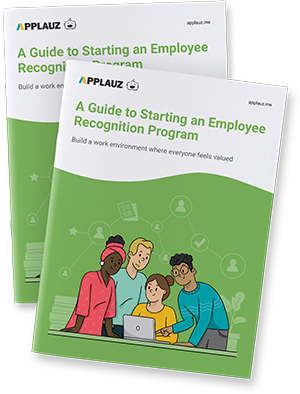You care about making team members feel valued. You’ve implemented an employee recognition program and regularly dish out positive feedback. But occasionally, you are confronted with the need to give an employee a piece of constructive criticism that skirts the line of being negative. What you do next, can make or break your relationship with your employee.
Research reveals that negative events at work have a more powerful effect on mood than positive ones. For example, employees react to a negative interaction with their manager six times more strongly than with a positive one. Feeling criticized by your boss can have devastating consequences on morale. According to Gallup, four out of five workers who received negative feedback are job hunting, looking for a reason to leave their current situation.
This doesn’t mean that you should shy away from sharing negative feedback; you need to make sure that it’s constructive. Pointing out areas of improvement is a necessary part of the process when helping people grow, which can ultimately motivate employees. However, it does mean that you need to be mindful about the way you approach the conversation.
Negative feedback isn’t about being harsh or criticizing someone. It’s about providing helpful guidance related to someone’s work or behavior at work – and doing so diplomatically. To help guide your efforts, here are 21 negative feedback examples.
Everything you need to know about employee recognition
 Negative Feedback Examples to Help Improve Performance
Negative Feedback Examples to Help Improve Performance
Feedback should be specific and actionable, providing details that will help the person on the receiving end of it make improvements. If you want to master your ability to give negative feedback gracefully, focus on concrete areas of improvement, which encompass the most important skills required to thrive at work, like the following categories:
Technical skills
Technical skills, which you can also refer to as hard skills, involve the specific expertise that someone brings to their role. For example, a data analyst excels at interpreting data. A writer has a strong command of their language.
If you want to give someone constructive feedback pertaining to their technical skills, consider these examples:
- "In the section discussing customer satisfaction trends, I noticed some inconsistencies in the data that could be clarified. Could you take a second look and update the report?”
- “I appreciate the creative risks that you took with this pitch deck, but having a clear value proposition is super important if we want to close this deal. Could you please rework slides 1-5 and highlight the main selling point?”
- “I wanted to give you some feedback on the most recent project you managed. It ended up being delivered several days after the deadline. Can we talk about it?”
Collaboration
Collaboration is the foundation of effective teamwork. If you notice that someone isn’t collaborating as much as they could be or that they’re preventing collaboration, here are examples of phrases you can use:
- "I appreciate how hard you’ve been working towards completing your tasks. However, I've noticed that there may be opportunities for us to collaborate more effectively as a team.”
- “I’d like to talk to you about something. I noticed that there have been a few meetings in a row where you haven’t contributed any ideas or participated. Is there anything I should know or anything I can do to help you collaborate more actively?”
- “Going forward, it would be great to work more collaboratively as a team. I’d love to see you sharing ideas more often and seeking opportunities to support colleagues and receive support.”
Communication
According to a Forbes Advisor survey, ineffective communication can harm the work environment: 49% of respondents reported that poor communication impacted their productivity and nearly 50% said it affected their job satisfaction.
Giving constructive feedback on poor communication skills is crucial. Here are examples of things you can say:
- "During our Monday sprints, I noticed that you sometimes seem to struggle to clearly articulate your thoughts and express them concisely. This can sometimes lead to misunderstandings among team members. Can I help you find ways to communicate your ideas more effectively?”
- “I know that presentations can be super anxiety-inducing. I realize that having to present is stressing you out, but it’s a super important part of your job. Would you consider a public speaking workshop? I'm confident that you have the potential to excel in this area, and I'm here to help you get there."
- “I wanted to share a piece of feedback about that project update that you sent by email. In the future, could you take more time to proofread before hitting ‘send’? There were several typos in it, and the last paragraph was missing a sentence. Mistakes can happen, but with projects that involve so many people, I’d rather veer on the side of caution with communications in order to avoid confusion.”
Interpersonal skills
Being a good listener, showing empathy, dealing with conflict effectively and bringing a positive attitude to the table are examples of interpersonal skills. These skills are as – if not more – important than technical skills. You cannot have a healthy workplace culture without them.
So, if you need to give feedback to someone about their interpersonal approach, here’s how to broach the topic:
- "Conflicts will arise. But it's essential to navigate them constructively. Let's work on finding more helpful ways to address disagreements and reach resolutions before things escalate."
- "I’ve noticed that you seemed angry during that meeting. Your mood and attitude can have a significant impact on the team. Is there something going on that you want to talk about? We’re all human and it’s normal to have bad days, but being able to approach challenges with positivity makes a huge difference in our culture.”
- "Can I talk to you about something? During the end of the meeting, I got the sense that [Colleague] didn’t feel acknowledged by you when sharing their experience. Putting yourself in others' shoes even if you don’t agree with them can go a long way for building trust.”
Adaptability
In a business landscape that keeps rapidly evolving and being disrupted, adaptability may just be the most important workplace skill. Here are examples of things you can say if you want to tell a report to work on their ability to adapt:
- "As our priorities and business objectives evolve, it's essential to be flexible in our approach. I realize that change can be uncomfortable. What can I do to support you in navigating these uncertain times?”
- "I've noticed that you have yet to use the new project-management platform. Adapting to new processes can be challenging. Can we develop strategies to enhance your ability to adjust quickly to changes in the way we work?”
- "This week was tough for our team. When faced with unexpected obstacles, being solutions-oriented is key, even if things feel daunting. Let's work on developing your problem-solving skills to improve your adaptability."
Initiative
Employees who take initiative raise the bar when it comes to team performance. The opposite is also true. If you notice that a team member could be more proactive, use the following examples to give constructive feedback:
- "You’ve been doing all your tasks and doing them well. However, going forward, I'd like to see you take initiative more often by doing things like seeking out new opportunities or taking ownership of your projects. Please let me know how I can support you.”
- "Last week, I noticed that when the [situation] came up, you didn’t flag it when it came up. Reacting faster could have helped us avoid the issues that ensued. If you’re unsure about how to be more proactive in your role, please don’t hesitate to ask for guidance. I am here to support you.”
- "I wanted to take a minute to share something. If this ever happens again, don't hesitate to take the initiative and get the ball rolling on finding solutions. You don’t always need to wait for instructions – we have to move fast here so we really value proactivity.”
Productivity and time-management
According to Zippia, the average worker spends 51% of their day on low- to no-value tasks. Giving team members feedback on productivity and time management is key if you want to avoid the pitfalls of busy work. Here are things you can say:
- “I’ve been concerned that you’re struggling to stay on top of all your deliverables. Could we go over your tasks and responsibilities together and identify priorities?”
- “I am worried that you’ve taken on too much and that the quality of your work is suffering as a result. Can we chat about ways to manage your workload more effectively?”
- “I’ve noticed that it’s been harder for you to meet deadlines in the past few weeks. I am here to support you and find solutions.”
Alignment
Alignment is about working towards common goals and embodying common core values. If an employee seems out of alignment, it’s important to bring it up. The following feedback examples can help you start an honest discussion:
- "I feel like we could do a better job as a team to align our goals with bigger organizational objectives. I noticed that you’ve been working a lot on [project 1], but [project 2] is actually a bigger priority. Could you please focus more on [project 2]?”
- “As a team, it’s important that we show a united front when meeting with potential clients. I value your feedback, but could you wait until we’re not in front of a client before sharing it moving forward?”
- “I want to share a piece of feedback with you. I know you’re passionate about your work, but kindness is one of our core values and the way you spoke during the team meeting came across as harsh. In the future, perhaps take a moment to cool down instead of saying something rude to a teammate.”
 The Dos and Don’ts of Giving Negative Feedback
The Dos and Don’ts of Giving Negative Feedback
The examples above should help you give feedback with tact and show team members that you care about helping them succeed. You should also keep the following universal principles in mind when offering constructive feedback.
Dos:
- Always mention specific examples
- Focus on behaviors instead of personality traits
- Offer actionable suggestions for improvement
- Deliver the feedback privately
- Encourage a two-way conversation
- Follow-up to see how your team member is doing
- Show them that you believe in their ability to improve
Don'ts:
- Put down or criticize the person
- Use generalizations or beat around the bush
- Give negative feedback in front of other people
- Lose your temper
- Neglect the importance of offering support
- Show favoritism and bias – hold everyone to the same standards
While delivering negative feedback in the workplace isn’t as pleasant as sharing words of appreciation, it’s still important in certain situations and helps your team improve. Use the insights in this article to do it effectively, and make sure you’re also frequently acknowledging wins and giving recognition.
Employee recognition, and constructive feedback generally, is a key motivator for effective teams--It is your secret weapon to increasing productivity, reducing turnover and improving company culture. An employee recognition platform like Applauz can help make recognition a key factor in your teams success.
It's not too late to start building a culture of constructive feedback. Start the process today!
A Guide to Starting an Employee Recognition Program in 2025
Frequently Asked Questions
What is the importance of feedback culture in the workplace?
Feedback culture refers to the environment where giving and receiving feedback is encouraged, valued, and integrated into everyday operations. It fosters open communication, continuous improvement, and employee engagement.
How does the feedback process typically work in organizations?
The feedback process involves several steps, including setting clear expectations, providing timely and constructive feedback, discussing areas of improvement, and creating action plans for professional growth. It often occurs through one-on-one meetings, performance reviews, or informal check-ins.
What makes feedback effective?
Effective feedback is specific, actionable, and focused on behaviors rather than personal traits. It is also delivered with empathy and a genuine desire to help the recipient improve. Additionally, effective feedback is timely and provided in a supportive manner.
How should managers deliver critical feedback to employees?
When delivering critical feedback, managers should approach the conversation with empathy and sensitivity. They should focus on the behavior or performance issue rather than criticizing the individual. It's important to offer concrete examples, discuss the impact of the behavior, and collaborate on solutions for improvement.
What role do performance reviews play in the feedback process?
Performance reviews serve as formal evaluations of an employee's work performance over a specific period. They provide an opportunity for managers to offer feedback on strengths, areas for improvement, and goals for professional development. Performance reviews contribute to ongoing feedback and employee growth.
How does negative feedback contribute to professional development?
Negative feedback, when delivered constructively, offers valuable insights into areas where an employee can improve. By addressing weaknesses and providing guidance for growth, negative feedback supports professional development and helps employees reach their full potential.
How can organizations foster a culture of constructive feedback?
Organizations can foster a culture of constructive feedback by promoting open communication, providing training on giving and receiving feedback, recognizing and rewarding feedback initiatives, and creating a safe and supportive environment for sharing opinions and ideas.
What are some strategies for handling negative feedback effectively?
When receiving negative feedback, it's essential to listen actively, seek clarification if needed, avoid becoming defensive, and express gratitude for the insights provided. Reflect on the feedback, identify areas for improvement, and take proactive steps to address them.
How can employees use negative feedback to their advantage?
Employees can use negative feedback as an opportunity for growth and development. They can leverage the feedback to identify areas for improvement, set goals, seek additional support or training, and demonstrate their commitment to continuous learning and improvement.
How does constructive feedback contribute to a positive work environment?
Constructive feedback promotes transparency, trust, and accountability within teams. It fosters a culture of learning and improvement, enhances teamwork and collaboration, and ultimately contributes to a more positive and productive work environment.
About the author
Anouare Abdou
Anouare Abdou is a seasoned HR and business writer passionate about leadership, productivity, and the future of work. Her words have appeared in Business Insider, The Ladders, Thrive Global and more.

